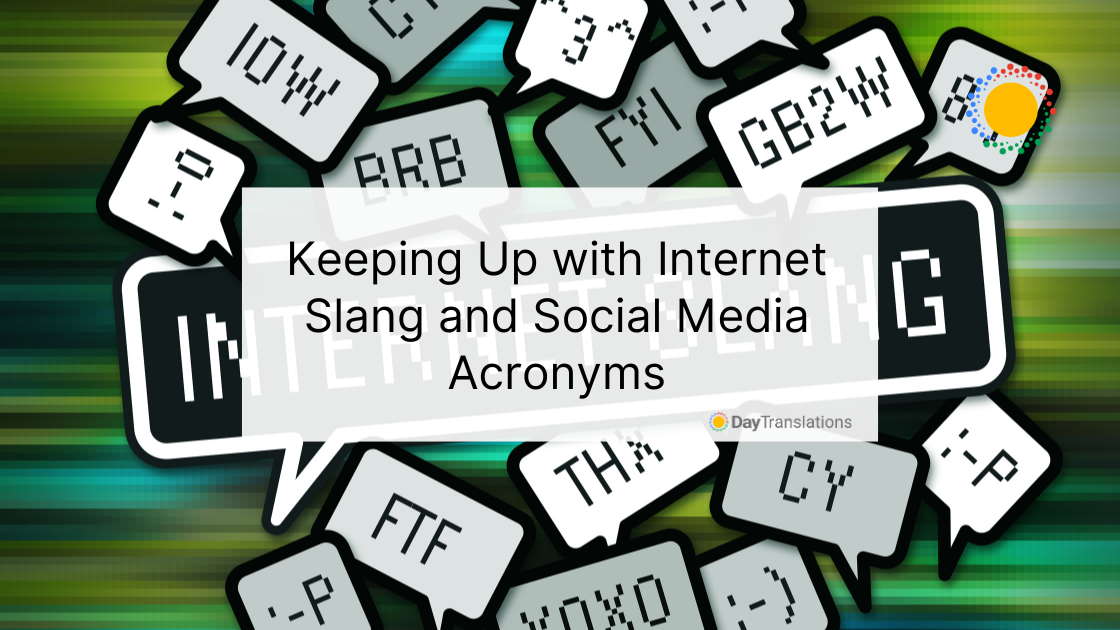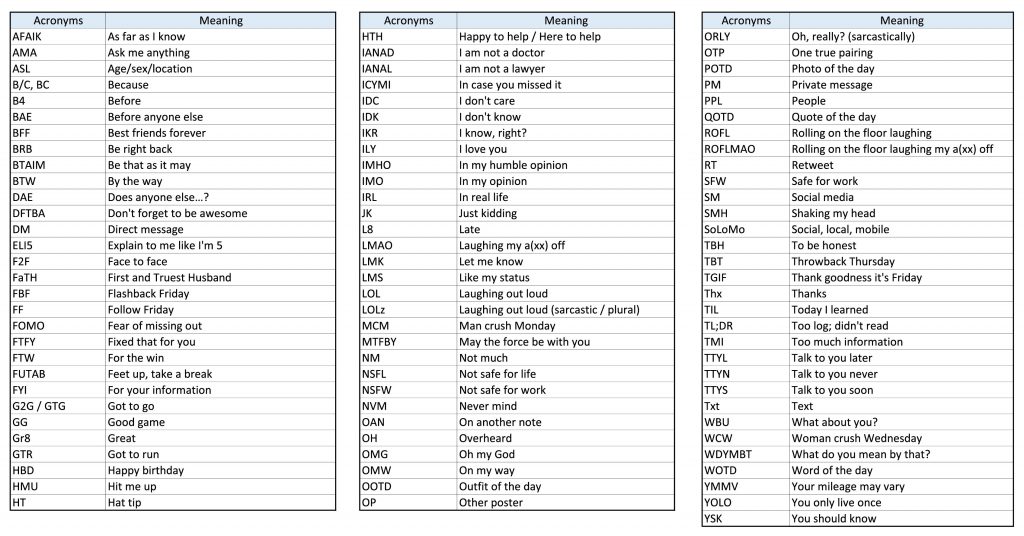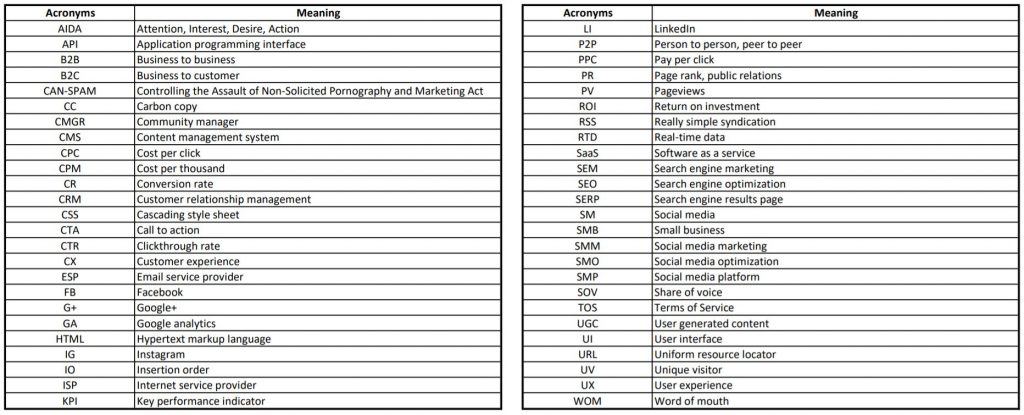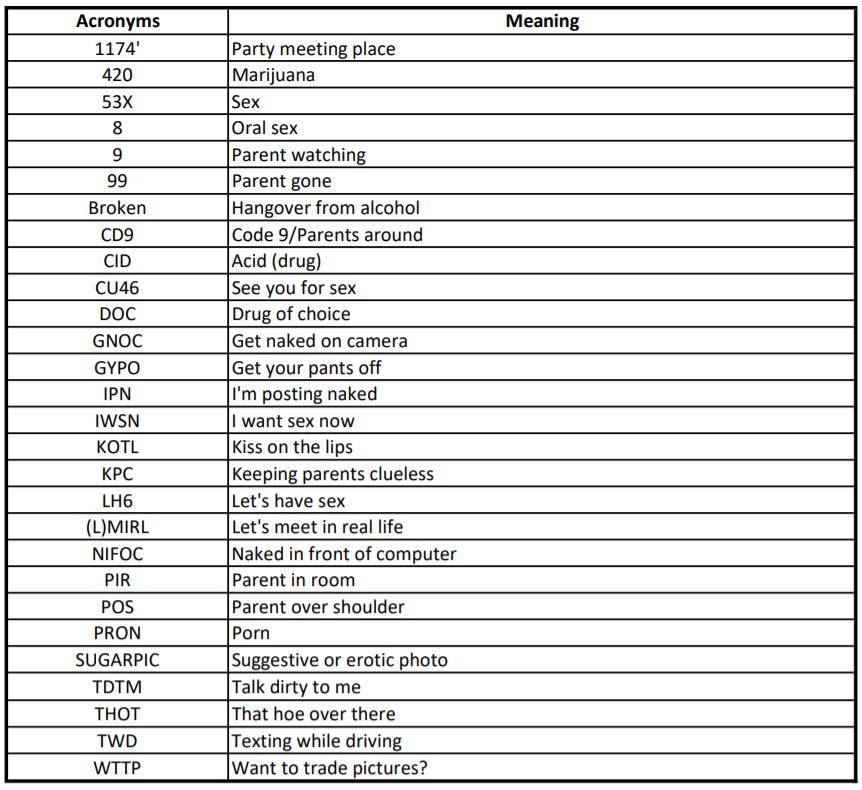When you go online, chat with friends and join forums, you might have encountered a number of acronyms and abbreviations that make you scratch your head in trying to figure out what they mean. These are called Internet slang, chatspeak, netspeak, cyber slang or Internet shorthand.
They are popularized by the thousands of online users. In several cases, they were also the ones that coined many of these Internet shorthand. Actually, the original terms used by text message senders were borne out of necessity, because of the limit in the number of characters in the early versions of mobile phones.
The Deal with Internet Slang
Internet slang was created when the Internet was still new but some of the words used were older than the Internet. While they facilitate communication to those who know and understand them, it can take twice the time for uninitiated people to decipher what they mean, if at all. They could be troublesome, especially when the people chatting are not of the same generation or of the same age. It could be embarrassing, to say the list, to ask the person you’re chatting with for the meaning of the acronym that she/he just typed.
Internet slang also stunts people’s ability to communicate properly. They negate many of the practices and expectations associated with the written and spoken language. They present a nightmare to translation services providers as well, because they are difficult to translate into other languages.
On the other hand, the Internet becomes a fertile ground for the development of new slang due to the availability of information, enabling the creation of new languages for various online groups. Internet slang in effect, provides online communities with their own identity, because they are able to coin new words specific to their needs.
Aside from slangs, shorthand, abbreviations and acronyms, there are also a variety of expressions. One of the most popular is ”I can’t even” which seems incomplete. But you can regularly see it used in many forums, messages and chat rooms. It first appeared online in 2005. The expression means that someone was so overwhelmed by whatever emotion he or she is feeling at the moment and almost unable to handle it.
Internet Slang is a Broad Category
Internet slang and speak is so rich and constantly evolving, it is difficult to keep up with it. But the Internet is not the only source of these new acronyms, phrases, words and abbreviations. Some came from broadcast media while others are from popular shows, such as the 1940s radio show called, “It’s That Man Again” that became the source of TTFN or Ta Ta for now. Homer Simpson, a character from the popular TV series, ”The Simpsons” popularized the expression ”doh” or ”duh” to mean a comment on someone’s stupid or foolish action. It was so popular that it made it to the Oxford English Dictionary. Real life also contributes, as in the phrase, ”Give me the 4-1-1.” The term 4-11 is the number to dial when you want to get information.
Some Acronyms You (should) Know
It’s definite that there are hundreds of acronyms, Internet slangs, abbreviations and what have you’s floating around the Web that you know (or not know). The good thing is that there are kind souls who translate these things for people who form the baby-boomers, the X generation, the Y generation and for some millennials whose entire lives do not involve on being connected.
This list is by no means complete, but you’ll be able to understand what those abbreviations in text messages you receive on your mobile phones and other online communication platforms.
General abbreviations – these are a combination of old and new acronyms
Some abbreviations refer to industry and businesses, like the following:
The acronyms above are very safe but parents have to be aware of other acronyms that their child might be exposed to. There is no harm in being vigilant and it pays to know these things, to ensure your children’s safety.
Acronyms and Internet Slang in Other Languages
Now, here’s something different, not new, but in different languages, which you can use to wow your friends.
Thais are also updated when it comes to netspeak or chatspeak. One of the most common acronyms, LOL is 555 in Thai. This is because the pronunciation of the number 5 is similar to ”ha” or the letter ”h” therefore typing three 5s in succession is like saying ”hahaha.”
Your Portuguese friend might be typing SQN, which translates to só que não. In English, the nearest equivalent is ”just no,” which is something you can use when you are not in the mood to do anything.
Another Portuguese acronym with the closest translation in English is a ”good deal” is BBB or Bom, Bonito, Barato. Individually, the words mean good, pretty, cheap but BBB is better sounding.
In previous years, LOL, ROFL, LMAO were some of the acronyms you’d use when your chat mate cracked a joke. But in a country like Germany, the reply now is a simple ”g.” In the German language, this is their symbol for Grinsen or grinning in English 😀. When the joke’s very funny, you can type three g’s (ggg), which represents ganz großes Grinsen. In English, it means a very big grin. The Swedes use the letters ”asg” to indicate Asgarv, which is ”intense laughter” in English.
The French have a few acronyms as well, such as JTM for je t’aime, MDR (mort de rire) or “dying of laughter” in English. DSL is the French chatspeak or textspeak for désolé that stands for “sorry.”
Tech Limits for Internet Slang
There are some technological limitations for languages that are not written using the Latin alphabet but as they say, things are invented out of necessity. Therefore, it brought forth the Arabic Chat Alphabet, also called Franco-Arabic, Arabish or Arabizi, where they are able to write some Arabic words quickly by combining Latin alphabet and Arabic numerals. The letter qāf, is represented by the number 9. In the Latin alphabet, this is the letter Q. So when you see ”9alb” it stands for qalb or ”heart” in Arabic.
Our Spanish friends do it brilliantly, although it could be confusing at first. XQ could stand for ”why” or por qué and ”because” or porque. The English preposition ”for” is para in Spanish and they use XA to represent this. XFA is their acronym for por favor or ”please” in English, while XO stands for pero or ”but.”
But what is the relevance of all the Xs? Well, X here is the a mathematical symbol for multiplication. For example, we refer to 2 x 5 as 2 ”times” 5. The Spanish equivalent of ”times” is por. Do you see the connection? XFA = por favor, XQ = por qué/porque and so on. There’s some haziness in the usage, but you get the idea.
New Vocabulary
The Internet has brought about many things that are extraordinary. Now, some words have completely new meanings. These are closely related to emojis and memes that are also in vogue today.
Attention span – previously, average humans were said to have an attention span of 12 seconds, but that had been reduced to 8 seconds over the years. Compare that to a goldfish that has an attention span is 9 seconds. Therefore, an average person’s attention span is shorter than that of a gold fish. Ouch!
Autotune – audio processing system that turns irrelevant videos into something famous or viral.
Binge-watching – watching movies/videos continuously like a TV addict, which is very much similar to binge-eating.
Boomerang – an expression taken from an app of the same name that turns IG pics into GIFs. So instead of requesting someone to convert your IG pics, you just say, ”Please boomerang these.”
Knowmad – people who roam the world and share their travel experiences by uploading tons of pictures and videos of places they have visited on their social media page. It’s a combination of ”knowledge” and ”nomad.”
Lurk/Lurker – a friend who reads all the posts/messages in group chats or in forums but doesn’t participate.
Nomophobia – a word that combines the Greek term, phobia or panic and a ”no mo,” which is short for ”no mobile phone.” A nomophobic person is one who panics when he or she is without a cell phone.
Twitterature – a combination of Twitter and literature to refer to persons who create names for a variety of things.
Troll – a person, usually on the Internet, who likes to leave challenging and intriguing comments on different online forums to incite arguments and controversy.
Wexting – a combination of walking and texting with the head down. It refers people who cannot seem to let go of their phones and continue to indulge in exchanging text messages, unmindful of where they are going.
Final Thoughts
There are more acronyms and abbreviations on social media sites than what you can read here. Some of them are exclusive to the individual social media sites. It is GR8 to understand some of them so you do not feel left out. In a way these Internet slang and acronyms enrich your vocabulary indirectly.
Many of these internet slang phrases are here to stay. You can even find some of them in official dictionaries nowadays. But will they ever replace proper grammar? We think not! Sure, slang phrases might speed up online communication, especially in the younger generations. But we can’t use them in place of proper language!















stay fit blog
Posted at 04:04h, 04 OctoberI was suggested this web site by my cousin. I am not sure whether this
post is written by him as nobody else know such detailed about my trouble.
You are amazing! Thanks!
Web hosts
Posted at 12:25h, 05 DecemberThank you, I have recently been searching for info about this topic for a while and yours is the greatest I’ve came upon till now.
However, what in regards to the conclusion? Are you sure
concerning the source?
สกรีนเสื้อเอง
Posted at 22:12h, 07 Decemberyou are really a just right webmaster. The web site loading speed
is incredible. It kind of feels that you are doing any unique trick.
Moreover, The contents are masterwork. you’ve done a great task on this matter!
จํานองบ้าน กี่วันได้เงิน
Posted at 06:01h, 09 DecemberVery nice article, totally what I wanted to find.
bad credit 3 month loans
Posted at 20:40h, 09 DecemberBe accurate and truthful as false info can result in your utility being denied
and a flag in your credit score bureau.
garden grow Lights
Posted at 04:36h, 10 DecemberIt’s not my first time to visit this web site, i am browsing this website dailly and get nice data from
here all the time.
ประตูเหล็กม้วน
Posted at 09:19h, 10 DecemberAppreciation to my father who told me on the topic of this web site, this website is actually awesome.
christmas arrangements
Posted at 15:36h, 10 DecemberThe proper Christmas floral present to ship.
หมอนผ้าห่มราคาถูก
Posted at 16:33h, 10 DecemberAs the admin of this web page is working, no question very soon it will be famous, due
to its quality contents.
floral arrangements funerals
Posted at 18:32h, 10 DecemberFTD’s beautiful arrangements function a reminder
of the gift of life and the spirit of hope.
mount bromo
Posted at 05:17h, 11 DecemberKeep on working, great job!
Vet Chichester
Posted at 07:41h, 11 DecemberHello. impressive job. I did not imagine this.
This iss a excellent story. Thanks!
where can I get cash advance
Posted at 08:50h, 11 DecemberThe IRS will be working to process refunds as they receive tax returns.
Order Funeral Flowers
Posted at 10:45h, 11 DecemberHonor the departed’s spiritual or cultural perception with flowers
appropriate for a viewing or wake, funeral, cremation or graveside service.
frasi di natale 2018
Posted at 13:39h, 11 DecemberWe are a group of volunteers and starting a new scheme
in our community. Your web site provided us with valuable information to work on. You have done a formidable job and our entire community will be grateful to you.